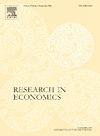Unveiling how blockchain-based internal auditing practices impact SDG 8 achievement? Mediating role of digital green corporate social responsibility
IF 1.2
Q3 ECONOMICS
引用次数: 0
Abstract
This research aims to assess the critical function of Blockchain-based internal auditing practices (BBIAP) in relation to Sustainable Development Goal 8 achievement (SDG8A) by investigating the mediating influence of digital green corporate social responsibility (DGCSR) within the framework of an emerging nation. Partial least squares structural equation modeling was employed to analyze a sample of 614 participants from public sector organizations. The findings indicate that BBIAP substantially affects SDG8A. Furthermore, DGCSR partially mediates the relationship between BBIAP and SDG8A. This study's findings provide organizations with insights to enhance their internal auditing practices, thereby advancing corporate social responsibility and the attainment of sustainable development goals in organizational operation.
揭示基于区块链的内部审计实践如何影响可持续发展目标8的实现?数字绿色企业社会责任的中介作用
本研究旨在通过调查新兴国家框架内数字绿色企业社会责任(DGCSR)的中介影响,评估基于区块链的内部审计实践(BBIAP)与可持续发展目标8实现(SDG8A)相关的关键功能。采用偏最小二乘结构方程模型对来自公共部门组织的614名参与者进行了样本分析。研究结果表明,BBIAP显著影响SDG8A。DGCSR在BBIAP和SDG8A之间起到部分中介作用。本研究的发现为组织提供了加强内部审计实践的见解,从而促进企业社会责任和实现组织运营的可持续发展目标。
本文章由计算机程序翻译,如有差异,请以英文原文为准。
求助全文
约1分钟内获得全文
求助全文
来源期刊

Research in Economics
ECONOMICS-
CiteScore
1.40
自引率
0.00%
发文量
37
审稿时长
89 days
期刊介绍:
Established in 1947, Research in Economics is one of the oldest general-interest economics journals in the world and the main one among those based in Italy. The purpose of the journal is to select original theoretical and empirical articles that will have high impact on the debate in the social sciences; since 1947, it has published important research contributions on a wide range of topics. A summary of our editorial policy is this: the editors make a preliminary assessment of whether the results of a paper, if correct, are worth publishing. If so one of the associate editors reviews the paper: from the reviewer we expect to learn if the paper is understandable and coherent and - within reasonable bounds - the results are correct. We believe that long lags in publication and multiple demands for revision simply slow scientific progress. Our goal is to provide you a definitive answer within one month of submission. We give the editors one week to judge the overall contribution and if acceptable send your paper to an associate editor. We expect the associate editor to provide a more detailed evaluation within three weeks so that the editors can make a final decision before the month expires. In the (rare) case of a revision we allow four months and in the case of conditional acceptance we allow two months to submit the final version. In both cases we expect a cover letter explaining how you met the requirements. For conditional acceptance the editors will verify that the requirements were met. In the case of revision the original associate editor will do so. If the revision cannot be at least conditionally accepted it is rejected: there is no second revision.
 求助内容:
求助内容: 应助结果提醒方式:
应助结果提醒方式:


